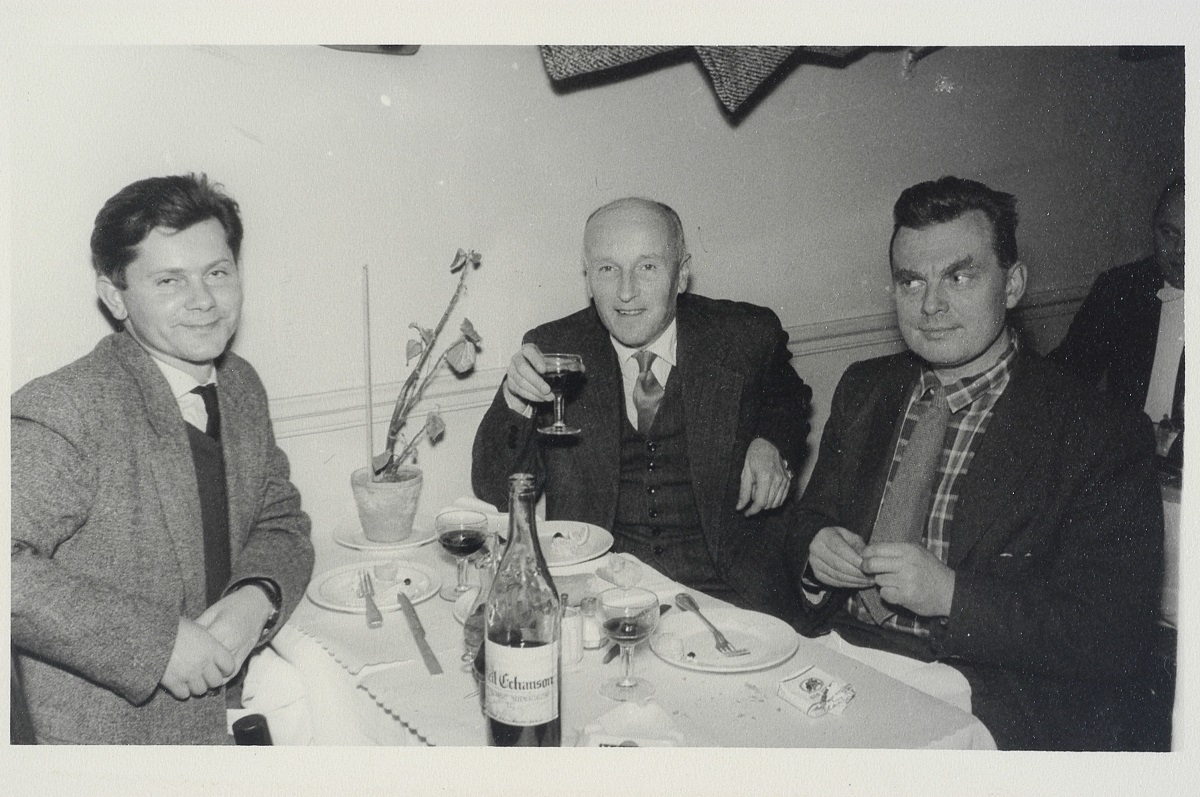
with Leopold Łabędź and Czesław Miłosz. Paryż (1958)

with Leopold Łabędź and Czesław Miłosz. Paryż (1958)
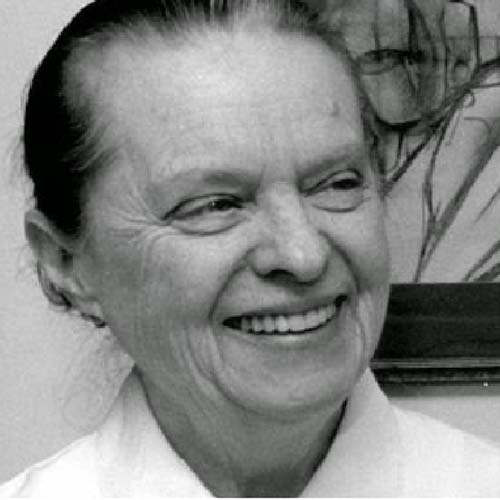
As Is
from Lost in the Funhouse
“The reader! You, dogged, uninsultable, print-oriented bastard, it's you I'm addressing, who else, from inside this monstrous fiction. You've read me this far, then? Even this far? For what discreditable motive? How is it you don't go to a movie, watch TV, stare at a wall, play tennis with a friend, make amorous advances to the person who comes to your mind when I speak of amorous advances? Can nothing surfeit, saturate you, turn you off? Where's your shame?”
“My dear fellow,' Burlingame said, 'we sit here on a blind rock careening through space; we are all of us rushing headlong to the grave. Think you the worms will care, when anon they make a meal of you, whether you spent your moment sighing wigless in your chamber, or sacked the golden towns of Montezuma? Lookee, the day's nigh spent; 'tis gone careening into time forever. Not a tale's length past we lined our bowels with dinner, and already they growl for more. We are dying men, Ebenezer: i'faith, there's time for naught but bold resolves!”
from The Sot-Weed Factorphotograph by Berenice Abbott (1926)
from Nightwood
“The perfume that her body exhaled was of the quality of that earth-flesh, fungi, which smells of captured dampness and yet is so dry, overcast with the odour of oil of amber, which is an inner malady of the sea, making her seem as if she had invaded a sleep incautious and entire. Her flesh was the texture of plant life, and beneath it one sensed a frame, broad, porous and sleep-worn, as if sleep were a decay fishing her beneath the visible surface. About her head there was an effulgence as of phosphorous glowing about the circumference of a body of water - as if her life lay through her in ungainly luminous deteriorations - the troubling structure of the born somnambule.”

with son Denis, East Harlem (1952)
Winter
I don’t know what to say to you, neighbor,
as you shovel snow from your part of our street
neat in your Greek black. I’ve waited for
chance to find words; now, by chance, we meet.
We took our boys to the same kindergarten,
thirteen years ago when our husbands went.
Both boys hated school, dropped out feral, dropped in
to separate troubles. You shift snow fast, back bent,
but your boy killed himself, six days dead.
My boy washed your wall when the police were done.
He says, “We weren’t friends?” and shakes his head,
“I told him it was great he had that gun,”
and shakes. I shake, close to you, close to you.
You have a path to clear, and so you do.
The Royal Gate

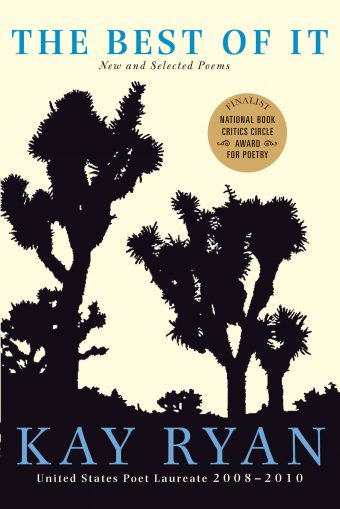


An Evening with Joseph Conrad
Joseph Conrad gave a reading at the London Library. A red-haired woman came up afterward. He had seen her circling earlier, taking a chair at the back, but he had not troubled about it. “I knew you in the Congo,” she said now. “I knew your wife.” My wife? he thought, but, as always after a reading, in the retreating roar of his own soul he could barely hear her or remember how English worked. Had she said “life,” not “wife”? Her voice, that of a crow, thrust at him—some weekend they’d “all spent together” and he’d sent her a letter the next day, a poem. Dread rose at the back of his mind; a parcel broke. He turned away, busied himself. He blamed, abhorred the touch of a past time; it surprised him how much. She followed him to the dinner that Charles (the London Librarian) had arranged at a nearby bistro, hurrying along behind everyone else, and, with the touch of his wife or his life burning like a toxin on his inside skin, Joseph Conrad could not meet her eyes or let pathos come clouding into him. When she seated herself at the foot of the table and was speaking loudly to anyone who listened, he felt the pluck of it on the side of his head but did not turn, he had to continue, now he’d begun, it was a long dinner. It was unjust. In other contexts, he admired perseverance. She was drowning. He did not turn. The light of pure reason, Joseph Conrad liked to say, resembles electricity in being cold. Proud statements like this came to him now and again when he was swimming but afterward seemed a bit off. No, it was a little nightmare, it was a rescue he could not carry out (and he was a rescuer).
But eventually the dinner ended. It was still 1907. No one had drowned. Shrugging into coats, they said hearty farewell things. He did not catch her eye. All left together to walk back toward the Library and go their ways. It was an early winter night. He began to feel fundamentally impatient with himself, hot with cowardice. He dropped back to walk beside her. His heartbeat was too fast. She did not seem surprised. An unknownness enveloped them, as if they were playing a game, as if they were draped in cloth or lost in old rooms. How they got to talking about white bread he could not remember afterward, but it shone in his mind, this conversation, as the bread had shone, and he was trying to tell her all that. Maybe she had mentioned lining up for bread in the early-morning dusk, sent out by her mother, running home with a loaf as heavy as two schoolbooks. When one dreamed of bread even now, Joseph Conrad agreed with her, it was not the rough black bread of childhood. Dream bread, mythic bread, was as white as a freshly laundered cuff.
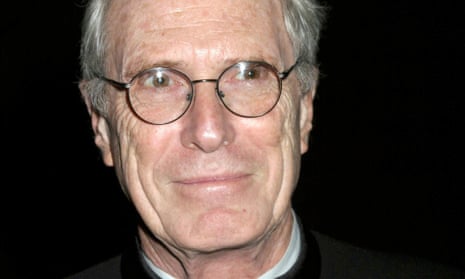
We have done what we wanted.
We have discarded dreams, preferring the heavy industry
of each other, and we have welcomed grief
and called ruin the impossible habit to break.
And now we are here.
The dinner is ready and we cannot eat.
The meat sits in the white lake of its dish.
The wine waits.
Coming to this
has its rewards: nothing is promised, nothing is taken away.
We have no heart or saving grace,
no place to go, no reason to remain.
from Blood Meridian, or the evening redness in the west
What is true of one man, said the judge, is true of many. The people who once lived here are called the Anasazi. The old ones. They quit these parts, routed by drought or disease or by wandering bands of marauders, quit these parts ages since and of them there is no memory. They are rumors and ghosts in this land and they are much revered. The tools, the art, the building — these things stand in judgement on the latter races. Yet there is nothing for them to grapple with. The old ones are gone like phantoms and the savages wander these canyons to the sound of an ancient laughter. In their crude huts they crouch in darkness and listen to the fear seeping out of the rock. All progressions from a higher to a lower order are marked by ruins and mystery and a residue of nameless rage. So. Here are the dead fathers. Their spirit is entombed in the stone. It lies upon the land with the same weight and the same ubiquity. For whoever makes a shelter of reeds and hides has joined his spirit to the common destiny of creatures and he will subside back into the primal mud with scarcely a cry. But who builds in stone seeks to alter the structure of the universe and so it was with these masons however primitive their works may seem to us.
 “This novel humbled me in a number of ways. I was reading manuscripts for a magazine called Accent, and had in front of my prose-bleary eyes a piece called “A Horse in a London Flat.” And I was in a doze. More dreariness. More pretension. When will it all end? How shall I phrase my polite rejection? Something, I don’t remember what it was now, but something ten pages along woke me up, as if I had nearly fallen asleep and toppled from my chair. Perhaps it was the startle of an image or the rasp of a line. I went back to the beginning, and soon realized that I had let my eyes slide over paragraphs of astonishing prose without responding to them or recognizing their quality. That was my first humiliation. I then carried the manuscript to my fellow editors, as if I were bringing the original “good news,” only to learn that they were perfectly familiar with the work of John Hawkes and admired it extravagantly. Hadn’t I read The Cannibal, or The Goose on the Grave? Where had I been! What a dummy! (Though my humiliation would have been worse if I had written that rejection.)A number of years had to erode my embarrassment before I could confess that I had not spotted him at once (as I initially pretended). What a dummy indeed. The Lime Twig is a beautiful and brutal book, and when it comes to the engravement of the sentence, no one now writing can match him.”
“This novel humbled me in a number of ways. I was reading manuscripts for a magazine called Accent, and had in front of my prose-bleary eyes a piece called “A Horse in a London Flat.” And I was in a doze. More dreariness. More pretension. When will it all end? How shall I phrase my polite rejection? Something, I don’t remember what it was now, but something ten pages along woke me up, as if I had nearly fallen asleep and toppled from my chair. Perhaps it was the startle of an image or the rasp of a line. I went back to the beginning, and soon realized that I had let my eyes slide over paragraphs of astonishing prose without responding to them or recognizing their quality. That was my first humiliation. I then carried the manuscript to my fellow editors, as if I were bringing the original “good news,” only to learn that they were perfectly familiar with the work of John Hawkes and admired it extravagantly. Hadn’t I read The Cannibal, or The Goose on the Grave? Where had I been! What a dummy! (Though my humiliation would have been worse if I had written that rejection.)A number of years had to erode my embarrassment before I could confess that I had not spotted him at once (as I initially pretended). What a dummy indeed. The Lime Twig is a beautiful and brutal book, and when it comes to the engravement of the sentence, no one now writing can match him.” 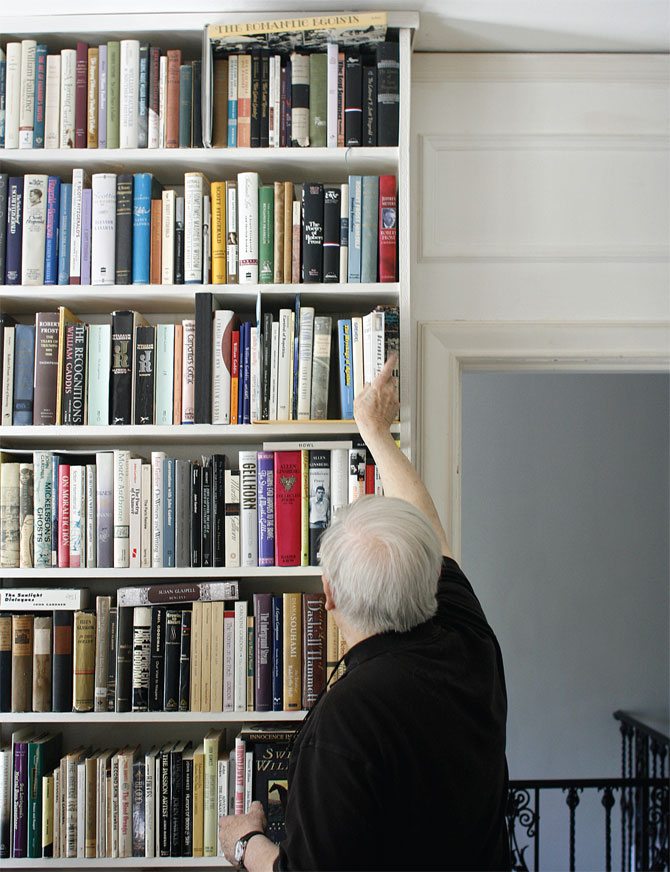
from Reading Rilke
from Middle C
“Nevertheless, it would be prudent to remain concerned. For, like death, IT would come: Armageddon. There would be-without exaggeration-a series of catastrophes. As a consequence of the evil in man...-no mere virus, however virulent, was even a burnt match for our madness, our unconcern, our cruelty-...there would arise a race of champions, predators of humans: namely earthquakes, eruptions, tidal waves, tornados, typhoons, hurricanes, droughts-the magnificent seven. Floods, winds, fires, slides. The classical elements, only angry. Oceans would warm, the sky boil and burn, the ice cap melt, the seas rise. Rogue nations, like kids killing kids at their grammar school, would fire atomic-hydrogen-neutron bombs at one another. Smallpox would revive, or out of the African jungle would slide a virus no one understood. Though reptilian only in spirit, the disease would make us shed our skins like snakes and, naked to the nerves, we'd expire in a froth of red spit. Markets worldwide would crash as reckless cars on a speedway do, striking the wall and rebounding into one another, hurling pieces of themselves at the spectators in the stands. With money worthless-that last faith lost-the multitude would riot, race against race at first, God against God, the gots against the gimmes. Insects hardened by generations of chemicals would consume our food, weeds smother our fields, fire ants, killer bees sting us while we're fleeing into refuge water, where, thrashing we would drown, our pride a sodden wafer. Pestilence. War. Famine. A cataclysm of one kind or another-coming-making millions of migrants. Wearing out the roads. Foraging in the fields. Looting the villages. Raping boys and women. There'd be no tent cities, no Red Cross lunches, hay drops. Deserts would appear as suddenly as patches of crusty skin. Only the sun would feel their itch. Floods would sweep suddenly over all those newly arid lands as if invited by the beach. Forest fires would burn, like those in coal mines, for years, uttering smoke, making soot for speech, blackening every tree leaf ahead of their actual charring. Volcanoes would erupt in series, and mountains melt as though made of rock candy till the cities beneath them were caught inside the lava flow where they would appear to later eyes, if there were any eyes after, like peanuts in brittle. May earthquakes jelly the earth, Professor Skizzen hotly whispered. Let glaciers advance like motorboats, he bellowed, threatening a book with his fist. These convulsions would be a sign the parasites had killed their host, evils having eaten all they could; we'd hear a groan that was the going of the Holy Ghost; we'd see the last of life pissed away like beer from a carouse; we'd feel a shudder move deeply through this universe of dirt, rock, water, ice, and air, because after its long illness the earth would have finally died, its engine out of oil, its sky of light, winds unable to catch a breath, oceans only acid; we'd be witnessing a world that's come to pieces bleeding searing steam from its many wounds; we'd hear it rattling its atoms around like dice in a cup before spilling randomly out through a split in the stratosphere, night and silence its place-well-not of rest-of disappearance. My wish be willed, he thought. Then this will be done, he whispered so no God could hear him. That justice may be served, he said to the four winds that raged in the corners of his attic.”
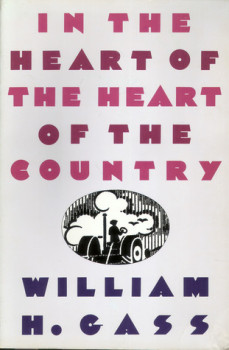
from
In the Heart of the Heart of the Country and Other Stories
“Sports, politics, and religion are the three passions of the badly educated. They are the Midwest's open sores. Ugly to see, a source of constant discontent, they sap the body's strength. Appalling quantities of money, time, and energy are wasted on them. The rural mind is narrow, passionate, and reckless on these matters. Greed, however shortsighted and direct, will not alone account for it. I have known men, for instance, who for years have voted squarely against their interests. Nor have I ever noticed that their surly Christian views prevented them from urging forward the smithereening, say, of Russia, China, Cuba, or Korea. And they tend to back their country like they back their local team: they have a fanatical desire to win; yelling is their forte; and if things go badly, they are inclined to sack the coach.”
Gass painted by Philip Guston
“Blue is the color of the mind in borrow of the body; it is the color consciousness becomes when caressed; it is the dark inside of sentences, sentences which follow their own turnings inward out of sight like the whorls of a shell, and which we follow warily, as Alice after that rabbit, nervous and white, till suddenly — there! climbing down clauses and passing through ‘and’ as it opens — there — there — we’re here!... in time for tea and tantrums; such are the sentences we should like to love — the ones which love us and themselves as well — incestuous sentences — sentences which make an imaginary speaker speak the imagination loudly to the reading eye; that have a kind of orality transmogrified: not the tongue touching the genital tip, but the idea of the tongue, the thought of the tongue, word-wet to part-wet, public mouth to private, seed to speech, and speech... ah! after exclamations, groans, with order gone, disorder on the way, we subside through sentences like these, the risk of senselessness like this, to float like leaves on the restful surface of that world of words to come, and there, in peace, patiently to dream of the sensuous, and mindful Sublime.”
― On Being Blue

from The Tunnel
Froissart. Adams. Gobineau. Like checkers, some king the carpet’s squares. Sober books. Bawds. They preoccupy my armchair like an injury. They press in. Ockham. Austen. Von Frisch. Pound. In overcoats. In satins. With illustrations. Aprons. Pindar. Heavy. Worn. Hardy, Hawthorne, Hazlitt, Hemingway, Henty, Hopkins, Housman, Hume. With loose bent torn dry yellow pages and broken glueless backs, some shaken outside of themselves, Webster, Ford, Lombroso, Chapman, Cleland, Chaucer, Berkeley, Boccaccio, Swift, by time, humidity, rough handling, their ferocious contents, Flavius Josephus, Bussy D’Ambois, some scratched, some marred with annotations, underlinings, exclamations, thumbprints, smears, Poe, Thomas, Plautus and Petronius, stained, checked, dented, mottled, eaten. Ibsen. And if anyone I knew—Chekhov, Veblen—were like that, I would flee them. But from Bradley? Burns? Bernanos? Browning? Gilded edges? Gaudy. Slick. They know how to age—each—they fly through time like a stone. King Lear. Colette. Une Vie. Le Corbusier. La Rochefoucauld. I have thrown them. Yes. They have broken me. Slammed them down. Been brought low. “The Good Anna.” Keller. “Boule de suif.” Embossed. In suede. Defoe. Received for birthdays, with a ribbon or a tasseled string and soiled by dedications, nameplates, erasures like rapacious moths, librarians’ pastes and inks. Great Expectations. We speak of their backs, their fronts, their spines . . . their bodies. Funny. Flatulent. Forsaken. Fielding. Frost. Find Planmantee. He’s somewhere—living his life inside a life like Madame Bovary—somewhere where nothing else is as it is, where everything’s as something else is, resembling the resembled to infinity—in metaphysics, mathematics, magic—where all are kith and kin and none are kind. I see Homer. He’s ceased singing, and sirens now warn us away. My lines suffer interruption, and these covers close over me. Hegel. Iamblichus. Pliny. Plato. Where is the Western Front now, you foolish old man? that trench of entrancing shadows, cardboard cutouts, supple fires? Don’t lie to me. The pokey where Socrates swigged his Dramamine was a hole in a hill. And Plotinus is also a cavern. These days the darkness that lies under the mind like the cool shade of a stream bottom yields our only safety, for to rush to the light is to Gloucester-out the eyes; bedazzled by death, to go over the top at someone else’s whistle and war shout, to fume up and fizz fast, die dirty, die young. Chatterton. What is a book but a container of consciousness, a draft of cantos? Through a curtain of concepts I watch blemishless girls, young Kierkegaard in all his disguises, Empedocles as a fish, bird, and girl, Stendhal and Byron like boys about their boasting, Boswell accosting his whores, Cellini, another braggart, honest Casanova, Pepys at table, Henry Miller, Gide committing Chopin and other indiscretions, Cudworth, Claudel, Jeremy Taylor, Mörike and then Baudelaire—the most beautiful name of all. Vico. Verlaine. Michelangelo—the most beautiful—Mallarmé—the most beautiful—Sophocles—the most beautiful name of all. The names of idols, vandals, heroes, lovers, cutthroats and cutpurses, gods . . . of guttersnipes and villains, thugs, poseurs, seducers, patsies . . . drunks . . . ¶Hear me, Hesiod: to sing of what will be, as well as all that was, takes more than the gift of a voice, these days, it takes a stomach stronger than a tomb. ¶The gods speak only of the gods. ¶In those days, then, what are we to do? What have we done? Villon. ¶There’s Demosthenespolishing his teeth with stones. Quintilian.

with David Markson (1964)
from The Recognitions

from JR
—He would absolutely have to have Alexander Pope in a box, to enjoy him. He is beyond anything I’ve ever come upon. Honestly, I never in my life could have imagined that business could live so powerfully independent of every other faculty of the human intelligence. Basil Valentine rested his head back, blowing smoke toward the ceiling, and watching it rise there. —Earlier, you know, he mentioned to me the idea of a novel factory, a sort of assembly line of writers, each one with his own especial little job. Mass production, he said, and tailored to the public taste. But not so absurd, Basil Valentine said sitting forward suddenly.
—Yes, I … I know. I know.
—When I laughed . . . but it’s not so funny in his hands, you know. Just recently he started this business of submitting novels to a public opinion board, a cross-section of readers who give their opinions, and the author makes changes accordingly. Best sellers, of course.
—Yes, good God, imagine if … submitting paintings to them, to a cross section? You’d better take out . . . This color . . . These lines, and . . . He drew his hand down over his face, —You can change a line without even touching it. No, he went on after a pause, and Valentine watched him closely, —nothing is funny in his hands. Everything becomes very . . . real.
from Oblivion:stories
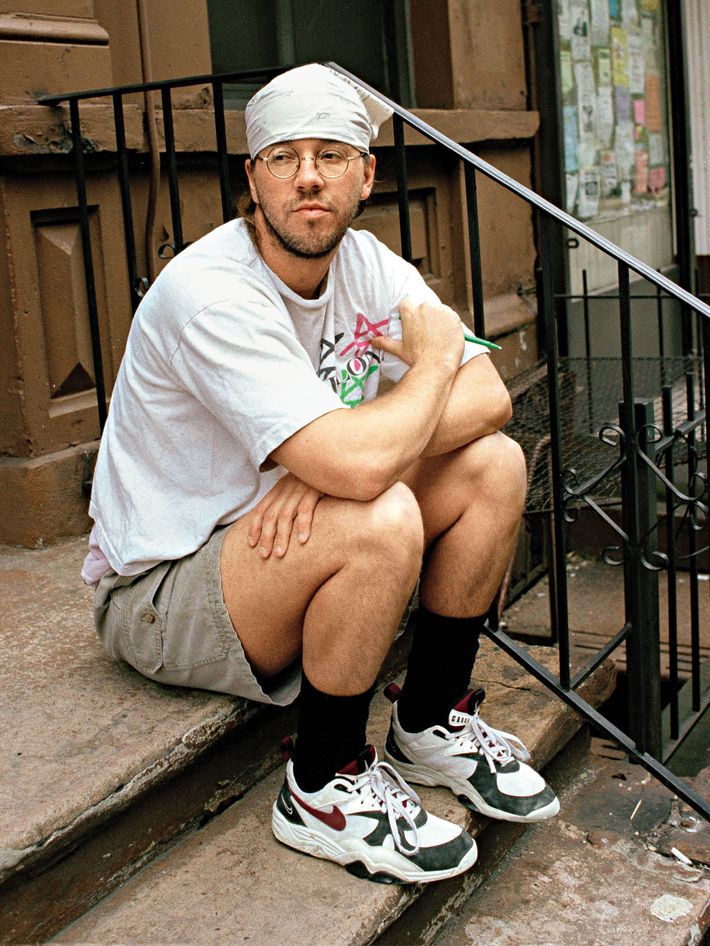
from A Conversation with David Foster Wallace David Lipsky
[…] And that as the Internet grows, and as our ability to be linked up, like—I mean, you and I coulda done this through e-mail, and I never woulda had to meet you, and that woulda been easier for me. Right? Like, at a certain point we’re gonna have to build up some machinery, inside our guts, to help us deal with this. Because the technology is just gonna get better and better and better and better. And it’s gonna get easier and easier, and more and more convenient, and more and more pleasurable, to be alone with images on a screen, given to us by people who do not love us but want our money. Which is all right. In low doses, right? but if that’s the basic main staple of your diet, you’re gonna die. In a meaningful way, you’re going to die.
But you developed some defenses?
No. This is the great thing about it, is that probably each generation has different things that force the generation to grow up. Maybe for our grandparents it was World War Two. You know? For us, it’s gonna be that at, at a certain point, that we’re either gonna have to put away childish things and discipline ourself about how much time do I spend being passively entertained? And how much time do I spend doing stuff that actually isn’t all that much fun minute by minute, but that builds certain muscles in me as a grown-up and a human being? And if we don’t do that, then (a) as individuals, we’re gonna die, and (b) the culture’s gonna grind to a halt.
[…]

from Infinite Jest
People of a certain age and level of like life-experience believe they’re immortal: college students and alcoholics/addicts are the worst: they deep-down believe they’re exempt from the laws of physics and statistics that ironly govern everybody else. They’ll piss and moan your ear off if somebody else fucks with the rules, but they don’t deep down see themselves subject to them, the same rules. And they’re constitutionally unable to learn from anybody else’s experience: if some jaywalking B.U. student does get his car towed, your other student’s or addict’s response to this will be to ponder just what imponderable difference makes it possible for that other guy to get splattered or towed and not him, the ponderer. They never doubt the difference — they just ponder it. It’s like a kind of idolatry of uniqueness.
from Pansies THE WHITE HORSE The youth walks up to the white horse, to put its halter on and the horse looks at him in silence. They are s...